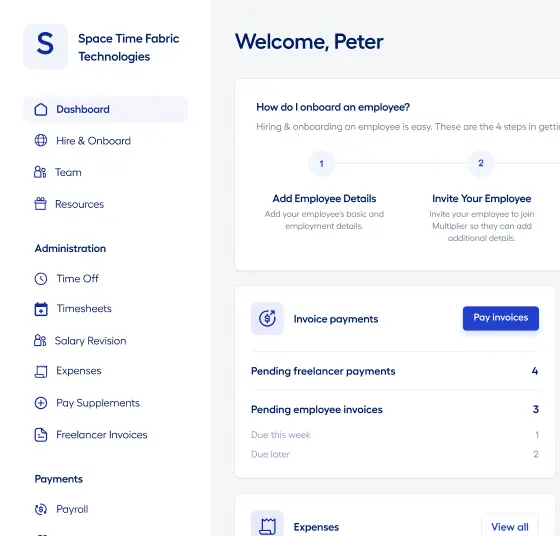Technology has made remarkable advancements, leading companies to shift their attention to foreign talents.
Recruiting people internationally gives organizations the required diversity, innovation, expertise, and refreshed synergy for business growth.
Going by numbers, the development of technologies like Artificial Intelligence (AI) has increased the volume of global recruitment. In the US and the UK, the volume of international hiring has increased by 58%.
However, global recruitment involves global employment laws that companies must comply with. Thus, we have prepared an international employment law guide to help you understand the legal nitty-gritty of global recruitment.
What is International Labor Law?
International labor law is a set of rules applicable through private and public international laws concerning the duties and rights of employees, employers, trade unions, and governments involved in workplace regulation.
Note: Private international law means the law between organizations and individuals living or operating in different countries. Whereas public international law means the legislation between different states or countries.
International labor law sometimes includes comparative law or the legal principles that apply across different countries. The bottom line is that international employment law covers all the laws applicable in different countries and the comparisons of laws between different countries too.
What are International Labor Standards?
International labor standards are conventions that protect basic employee rights, promote job security, and improve employment terms globally.
The International Labor Organization (ILO) is a United Nations Agency that sets these standards in 189 conventions or treaties agreed upon by international authorities. Once a country agrees upon and signs up to the labor standards, it must adopt and implement them as a part of its local laws.
Four fundamental labor policies are included in the ‘Declaration on Fundamental Principles and Rights at Work’.
- Child labor – 1 in 10 of all children around the world are victims of child labor. This fundamental labor policy ensures the effective prohibition of child labor.
- Forced labor – Numbers say that 40.3 million people are in modern slavery, including 24.9 in forced labor. This labor policy ensures prohibition on all forms of compulsory or forced labor.
- Discrimination at work – It has been observed that, on average, women are paid 23 percent less than their male counterparts. The discrimination at work policy prohibits unfair employment discrimination (based on any factor).
- Collective bargaining – This labor policy provides workers the right to freedom of association and collective bargaining. The right to collective bargaining enables the worker to choose a representative based on majority votes who can negotiate terms with the company management. Whereas the right to freedom of association indicates that workers are free to join unions to defend their rights.
Now that we have provided a detailed idea of international labor standards and laws let’s throw some light on international labor laws in the next section.
What are International Tax Laws?
One of the most complicated international employment law issues employers must consider is tax compliance.
Tax compliance is a crucial part of an organization’s legal obligations. Hence, when entering a new territory, employers must make it a priority to research the tax laws of the land.
For international businesses, employers must pay taxes in two locations. That means they need to understand two tax laws to ensure compliance. However, a few international agreements ease the tax obligations surrounding trade deals. And these are the critical areas that employers must know about.
If you are planning for a global recruitment drive, ensure that you understand the global talent laws. Further, if the taxation laws differ significantly, partner with an efficient and experienced international Professional Employer Organization (PEO) like Multiplier.
Multiplier’s PEO solution provides strong onboarding support. It also ensures managing employee benefits, expenses, payroll, and taxes.
Regional Labor Standards
Regional labor standards are a form of international labor law. It is a set of rules applicable to a select group of countries. Take, for example, the European labor law. The set standards of the European labor law apply to countries across the European Union.
The European labor law includes the following rights for employees.
- Right to free movement across the states of the European Union
- Right to a written employment contract (regardless of whether the hired employee is for a fixed-term or an indefinite contract)
- Right to a minimum of four weeks of annual leave
- Minimum health and safety standards
- Prohibition of workplace discrimination
- Limitations on redundancies
There are no rules in the European labor law that relates to minimum wage and collective bargaining. Hence, individual countries in the European Union determine these aspects.
Similarly, the United States (US), Canada, and Mexico agreed to enforce the labor standards included in the NAALC or North American Agreement on Labor Cooperation.
- Equal pay for equal work
- Right to strike and collective bargaining
- Right to organize; freedom of association
- Workers’ compensation
- Prohibition on child labor
- Migrant workers’ protection
- Health and safety standards
- Minimum labor standards related to workers’ wages, hours, and conditions of employment.
When planning an international expansion, ensure compliance with the international labor standards of the specific jurisdiction you expand into. Whereas considering regional labor standards, you must keep an eye on any standard that applies to the region you are moving into.
General Principles of Labor Law Across Countries
Global employment laws like international labor standards or EU laws have a cross-border reach. But in addition to these laws, there are a few general principles that employers must consider before expanding to a new country.
Minimum wage
Several countries like Canada, the US, Australia, Ireland, France, etc., have a minimum wage. Hence, organizations expanding to a country with minimum wage must be careful about complying with the principle. Enterprises must refrain from evading the minimum wage protections with independent contract arrangements.
Employee contracts
Many countries like Germany, Canada, the UK, the US, etc., require written employment contracts that set out the obligations of employers and employees. The employment contracts detail the working hours, employee’s job, pay, holidays, leaves, etc. In short, it sets out the terms of employment.
Employee benefits
Employee benefits are a key obligation for employers. They must withhold mandatory contributions to workers’ compensation, healthcare costs, pension, and unemployment insurance.
Payroll obligations
In almost every country, employers should withhold employee payroll taxes and submit them to the taxation authorities. However, employers submit payroll taxes for workers classified as employees only, not as independent contractors.
Employee termination
The employee termination policies are different from country to country. Even the policies can be different in-between states as well. For instance, employers can fire ‘at will’ in countries like the US. But in countries like France, an employer cannot terminate an employee without proper cause. In such countries, employee termination must follow a fair process.
If you plan an expansion, ensure that you are familiar with the key obligations of an employer. Stay updated with the local and international employment laws.
Employees vs. Independent Contractors: Role of International Employment Law
Any business expanding internationally must be aware of the cross-border employment laws. Especially regarding employee classification, employers must ensure that overseas workers have their proper professional status.
International employment law identifies the professional status of the overseas workforce. Typically, employees have a full contract, benefits, and salary that employers must provide. But independent contractors offer their services to the company independently. They are self-employed and act as sole traders.
On international expansion, employee guarantees (as mentioned above) must be a part of their contract. Else, the business can be considered non-compliant with the international employment law.
Employers must abide by global employment laws to avoid several penalties and legal complications. Misclassification of workers may cause certain consequences for employers like;
- Overtime pays;
- Economic compensation for contract termination;
- Massive penalties for misclassification; and
- Double monthly pay for failing to provide a written contract
Explore International Expansion with Multiplier
When it comes to global expansion, complying with international employment laws and domestic laws is crucial. Failing to comply with the laws can lead to penalties, legal issues with regulators, legal action from employees, and reputational harm.
Hence, to ensure full compliance with international labor laws, it is worth partnering with an experienced PEO that can take on all legal obligations of an employer.
Multiplier’s PEO/EOR solutions take care of everything relating to employees – starting from onboarding to paying in multiple currencies, employee benefits, payroll, and legal compliances. The EOR solution serves as the primary employer of your employees without you having to set up a new entity in the country where you plan to employ talents.
Start your free demo to explore this further.







